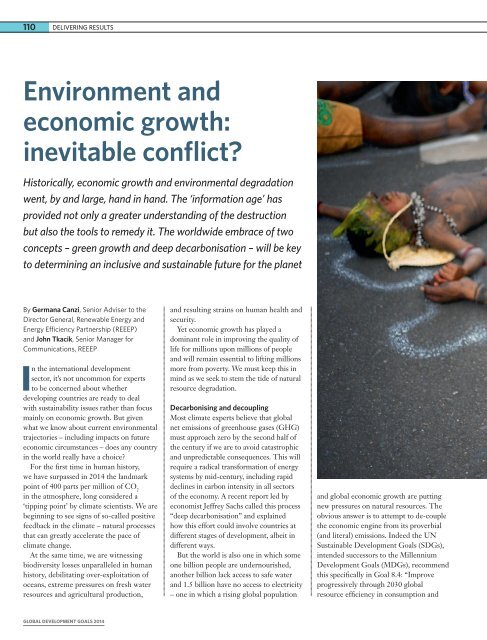FAMBB
FAMBB
FAMBB
Create successful ePaper yourself
Turn your PDF publications into a flip-book with our unique Google optimized e-Paper software.
110 DELIVERING RESULTSEnvironment andeconomic growth:inevitable conflict?Historically, economic growth and environmental degradationwent, by and large, hand in hand. The ‘information age’ hasprovided not only a greater understanding of the destructionbut also the tools to remedy it. The worldwide embrace of twoconcepts – green growth and deep decarbonisation – will be keyto determining an inclusive and sustainable future for the planetBy Germana Canzi, Senior Adviser to theDirector General, Renewable Energy andEnergy Efficiency Partnership (REEEP)and John Tkacik, Senior Manager forCommunications, REEEPIn the international developmentsector, it’s not uncommon for expertsto be concerned about whetherdeveloping countries are ready to dealwith sustainability issues rather than focusmainly on economic growth. But givenwhat we know about current environmentaltrajectories – including impacts on futureeconomic circumstances – does any countryin the world really have a choice?For the first time in human history,we have surpassed in 2014 the landmarkpoint of 400 parts per million of CO 2in the atmosphere, long considered a‘tipping point’ by climate scientists. We arebeginning to see signs of so-called positivefeedback in the climate – natural processesthat can greatly accelerate the pace ofclimate change.At the same time, we are witnessingbiodiversity losses unparalleled in humanhistory, debilitating over-exploitation ofoceans, extreme pressures on fresh waterresources and agricultural production,and resulting strains on human health andsecurity.Yet economic growth has played adominant role in improving the quality oflife for millions upon millions of peopleand will remain essential to lifting millionsmore from poverty. We must keep this inmind as we seek to stem the tide of naturalresource degradation.Decarbonising and decouplingMost climate experts believe that globalnet emissions of greenhouse gases (GHG)must approach zero by the second half ofthe century if we are to avoid catastrophicand unpredictable consequences. This willrequire a radical transformation of energysystems by mid-century, including rapiddeclines in carbon intensity in all sectorsof the economy. A recent report led byeconomist Jeffrey Sachs called this process“deep decarbonisation” and explainedhow this effort could involve countries atdifferent stages of development, albeit indifferent ways.But the world is also one in which someone billion people are undernourished,another billion lack access to safe waterand 1.5 billion have no access to electricity– one in which a rising global populationand global economic growth are puttingnew pressures on natural resources. Theobvious answer is to attempt to de-couplethe economic engine from its proverbial(and literal) emissions. Indeed the UNSustainable Development Goals (SDGs),intended successors to the MillenniumDevelopment Goals (MDGs), recommendthis specifically in Goal 8.4: “Improveprogressively through 2030 globalresource efficiency in consumption andGLOBAL DEVELOPMENT GOALS 2014


